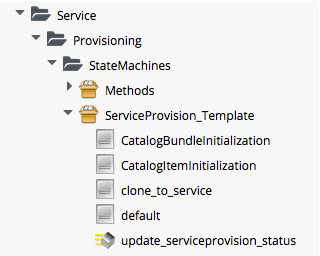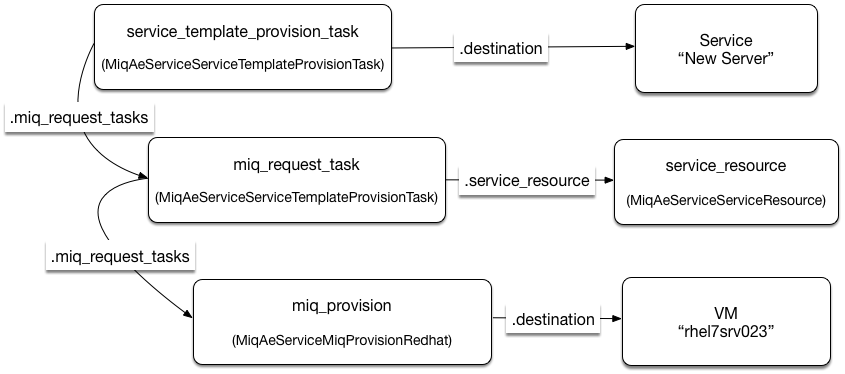The Service Provisioning State Machine
The Service Provisioning State Machine (Class ServiceProvision_Template) controls the sequence of steps involved in provisioning the service.

The ServiceProvision_Template Class schema contains a number of States, as shown (illustrated is the default Instance of this State Machine):

As can be seen, most of the fields are pre and post placeholders around the main provision and checkprovisioned states, to allow for optional processing if required. The configurechilddialog state (by default commented out) can be used to populate the options[:dialog] hash in the child task if required.
Passing Service Dialog Options to the Child and Grandchild Tasks
One of the more complex tasks that must be achieved by some state in the Service Provisioning State Machine is to pass the values received from the Service Dialog (if there is one), to the actual Tasks performing the provisioning of the VM(s). The complexity arises from the multiple types of Task object that are involved in creating the Service, the Service Resources, and the actual VMs.

This object hierarchy is represented at the highest level by the Service Template Provisioning Task (which we access from $evm.root['service_template_provision_task']).
The Service Template Provisioning Task has an assocation, .miq_request_tasks, containing the miq_request_task objects representing the creation of the service resource(s), which are items or resources making up the service request (even a single service catalog item is treated as a bundle containing one service resource).
Each child (service resource) miq_request_task also has a .miq_request_tasks assocation containing the VM Provisioning Tasks associated with creating the actual VMs for the service resource. This miq_request_task is provider-specific.
It is to the second level of miq_request_task (also known as the grandchild task) that we must pass the Service Dialog values that affect the provisioning of the VM (such as :vm_memory or :vm_target_name).
(see Service Objects for more details of the service object structure)
Accessing the Service Dialog Options
If a service dialog has been used in the creation of an Automation request (either from a Button or from a Service), then the key/value pairs from the service dialog are added to the Request and subsequent Task objects both as individual keys accessible from $evm.root, and to the Task object's options hash as the :dialog key.
$evm.root['service_template_provision_task'].options[:dialog] = \
{"dialog_option_0_service_name"=>"New Server", \
"dialog_option_0_service_description"=>"My New Server", \
"dialog_option_0_vm_name"=>"rhel7srv023", \
"dialog_tag_0_department"=>"engineering", \
"request"=>"clone_to_service"}
or
$evm.root['dialog_option_0_service_description'] = My New Server
$evm.root['dialog_option_0_service_name'] = New Server
$evm.root['dialog_option_0_vm_name'] = rhel7srv023
$evm.root['dialog_tag_0_department'] = engineering
Accessing the dialog options from .options[:dialog] is easier when we don't necessarily know the option name.
When we have several generations of child Task object (as we do when provisioning VMs from a service), we also need to pass the dialog options from the parent object (the Service Template Provision Task), to the various child objects, otherwise they won't be visible to the children.
The key/value pairs from the service dialog can be inserted into the .options[:dialog] hash of a child Task object, using the .set_dialog_option method:
stp_task = $evm.root["service_template_provision_task"]
vm_size = $evm.root['dialog_vm_size']
stp_task.miq_request_tasks.each do |child_task|
case vm_size
when "Small"
memory_size = 4096
when "Large"
memory_size = 8192
end
child_task.set_dialog_option('dialog_memory', memory_size)
end
This enables the child and grandchild VM Provision workflows (which run through the standard VM Provision State Machine that we have already studied) to access their own Task object .options[:dialog] hash, and set the custom provisioning options accordingly.